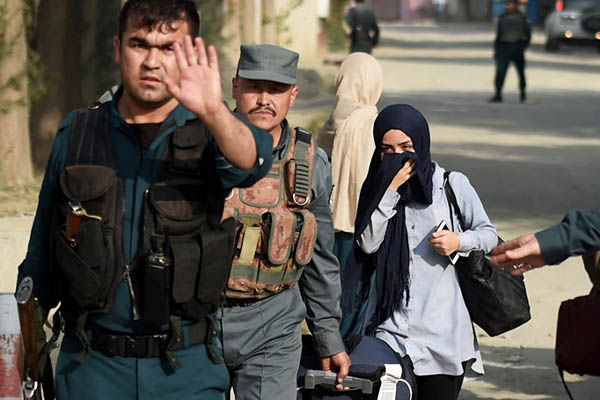
Wakil Kohsar—AFP
Nearly 10-hour raid leaves 12 people dead, at least 45 others injured.
At least 12 people were killed after militants stormed the American University of Afghanistan in Kabul, officials said on Thursday, in a nearly 10-hour raid that prompted anguished pleas for help from trapped students.
Explosions and gunfire rocked the campus after the attack began on Wednesday evening, just weeks after two university professors—an American and an Australian—were kidnapped at gunpoint near the school.
No group has so far claimed responsibility for the assault, but it occurred as Taliban insurgents ramp up their nationwide summer offensive against the Western-backed Kabul government.
“Seven students, one university guard and a guard from the neighboring vocational school for the visually impaired were martyred,” interior ministry spokesman Sediq Sediqqi told AFP, adding that three policemen were also killed.
At least 45 others were wounded, some of them critically, he said. It was not clear how many attackers mounted the assault but Kabul police said at least two of them were gunned down in the clearance operation.
Hundreds of trapped students were rescued during the overnight operation, many of whom tweeted desperate messages for help, with some using classroom furniture to barricade the doors.
The attack began just after dusk, when the private university is usually packed with students, many of them working professionals doing part-time courses. “I heard explosions and gunfire is going on close by… our classroom is filled with smoke and dust,” an anxious student told AFP by telephone, before fleeing the campus.
Many of the wounded were rushed into waiting ambulances outside the university on stretchers, as erratic gunshots rang out through the night. Authorities refused to confirm whether any hostages had been taken.
NATO military advisers helped Afghan forces to respond to the attack, a U.S. official said, without specifying how many troops were involved.
After the attack ended a few women students, some of them terrified and weeping, were escorted out of the campus at dawn by policemen.
“My brother-in-law’s daughter, a student, has disappeared,” said an anxious woman outside the university. “We have been looking for her since the attack began, we have searched all the hospitals but there is no trace of her.”
The attack, apparently the first major militant assault on a prominent university in Afghanistan, has cast a pall on the education sector, widely seen as a rare symbol of hope for the country’s burgeoning youth amid rising insecurity.
The growing number of students attending university, especially women, is hailed as a success story in Afghanistan since the 2001 ouster of the Taliban regime, which banned women’s education. “Terrorist groups, by attacking civilians, educational institutions, residential areas, culverts, bridges, electricity stations… want to obstruct growth and strengthening of the values that Afghans believe in,” President Ashraf Ghani said in a statement, condemning the “brutal attack.”
The elite American University of Afghanistan, which opened in 2006 and enrolls more than 1,700 students, was long seen as a high-profile target for militants partly because it attracts foreign faculty members. The two foreign professors at the university were seized from their vehicle on Aug. 7, as the kidnappers smashed the passenger window and hauled them away at gunpoint.
Their whereabouts are still unknown and no group so far has publicly claimed responsibility for the abductions, the latest in a series of kidnappings of foreigners in the conflict-torn country.
The uptick in violence comes as the Taliban escalate nationwide attacks, underscoring the worsening security situation in Afghanistan since NATO forces ended their combat mission at the end of 2014. Afghan forces backed by U.S. troops are seeking to head off a potential Taliban takeover of Lashkar Gah, the capital of the southern opium-rich province of Helmand.
The turmoil convulsing Helmand, blighted by a huge opium harvest that helps fund the insurgency, has left thousands of people displaced, sparking a humanitarian crisis as officials report food and water shortages. The Taliban have also closed in on Kunduz, leaving Afghan forces stretched on multiple fronts.
